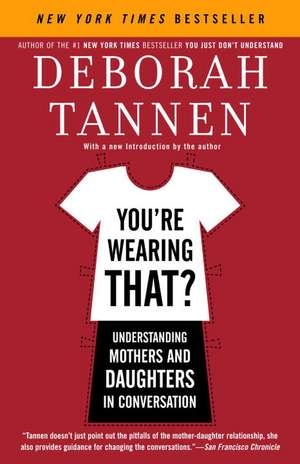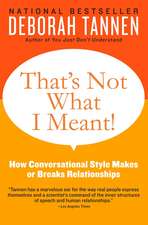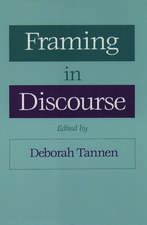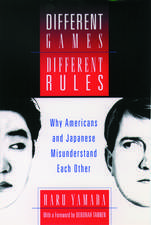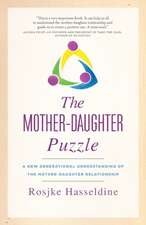You're Wearing That?: Understanding Mothers and Daughters in Conversation
Autor Deborah Tannenen Limba Engleză Paperback – 30 noi 2006
It was Tannen who first showed us that men and women speak different languages. Mothers and daughters speak the same language–but still often misunderstand each other, as they struggle to find the right balance between closeness and independence. Both mothers and daughters want to be seen for who they are, but tend to see the other as falling short of who she should be. Each overestimates the other’s power and underestimates her own.
Why do daughters complain that their mothers always criticize, while mothers feel hurt that their daughters shut them out? Why do mothers and daughters critique each other on the Big Three–hair, clothes, and weight–while longing for approval and understanding? And why do they scrutinize each other for reflections of themselves?
Deborah Tannen answers these and many other questions as she explains why a remark that would be harmless coming from anyone else can cause an explosion when it comes from your mother or your daughter. She examines every aspect of this complex dynamic, from the dark side that can shadow a woman throughout her life, to the new technologies like e-mail and instant messaging that are transforming mother-daughter communication. Most important, she helps mothers and daughters understand each other, the key to improving their relationship.
With groundbreaking insights, pitch-perfect dialogues, and deeply moving memories of her own mother, Tannen untangles the knots daughters and mothers can get tied up in. Readers will appreciate Tannen’s humor as they see themselves on every page and come away with real hope for breaking down barriers and opening new lines of communication. Eye-opening and heartfelt, You’re Wearing That? illuminates and enriches one of the most important relationships in our lives.
“Tannen analyzes and decodes scores of conversations between moms and daughters. These exchanges are so real they can make you squirm as you relive the last fraught conversation you had with your own mother or daughter. But Tannen doesn't just point out the pitfalls of the mother-daughter relationship, she also provides guidance for changing the conversations (or the way that we feel about the conversations) before they degenerate into what Tannen calls a mutually aggravating spiral, a "self-perpetuating cycle of escalating responses that become provocations." – The San Francisco Chronicle
From the Hardcover edition.
Preț: 90.95 lei
Nou
Puncte Express: 136
Preț estimativ în valută:
17.40€ • 18.61$ • 14.51£
17.40€ • 18.61$ • 14.51£
Carte indisponibilă temporar
Doresc să fiu notificat când acest titlu va fi disponibil:
Se trimite...
Preluare comenzi: 021 569.72.76
Specificații
ISBN-13: 9780812972665
ISBN-10: 081297266X
Pagini: 279
Dimensiuni: 132 x 203 x 18 mm
Greutate: 0.23 kg
Editura: BALLANTINE BOOKS
ISBN-10: 081297266X
Pagini: 279
Dimensiuni: 132 x 203 x 18 mm
Greutate: 0.23 kg
Editura: BALLANTINE BOOKS
Notă biografică
Deborah Tannen is the acclaimed author of You Just Don’t Understand, which was on the New York Times bestseller list for nearly four years; I Only Say This Because I Love You, which won the Books for a Better Life Award; Talking from 9 to 5, a New York Times bestseller; That’s Not What I Meant!; and many other books. A professor of linguistics at Georgetown University, she appears frequently on such shows as The Oprah Winfrey Show, Today, Good Morning America, Nightline, 20/20, and NPR’s All Things Considered. She lives with her husband in the Washington, D.C., area. Her website is www.deborahtannen.com.
To schedule a speaking engagement, please contact American Program Bureau at www.apbspeakers.com
From the Hardcover edition.
To schedule a speaking engagement, please contact American Program Bureau at www.apbspeakers.com
From the Hardcover edition.
Extras
Chapter 1
Can We Talk?
Mothers and Daughters in Conversation
My daughters can turn my day black in a millisecond,” says a woman whose two daughters are in their thirties.
Another woman tells me, “Sometimes I’ll be talking on the phone to my mom, and everything’s going fine, then all of a sudden she’ll say something that makes me so mad, I just hang up. Later I can’t believe I did that. I would never hang up on anyone else.”
But I also hear comments like these: “No one supports me and makes me feel good like my mother. She’s always on my side.” And from the mother of a grown daughter: “I feel very lucky and close with my daughter, and particularly since I didn’t have a close relationship with my mother, it’s very validating for me and healing.”
Mothers and daughters find in each other the source of great comfort but also of great pain. We talk to each other in better and worse ways than we talk to anyone else. And these extremes can coexist within the same daughter-mother pairs. Two sisters were in an elevator in the hospital where their mother was nearing the end of her life. “How will you feel when she’s gone?” one asked. Her sister replied, “One part of me feels, How will I survive? The other part feels, Ding-dong, the witch is dead.”
The part of a daughter that feels “How will I survive?” reflects passionate connection: Wanting to talk to your mother can be a visceral, almost physical longing, whether she lives next door, in a distant state, in another country—or if she is no longer living on this earth. But the part that sees your mother as a wicked witch—a malevolent woman with magical power—reflects the way your anger can flare when a rejection, a disapproving word, or the sense that she’s still treating you like a child causes visceral pain. American popular culture, like individuals in daily life, tends to either romanticize or demonize mothers. We ricochet between “Everything I ever accomplished I owe to my mother” and “Every problem I have in my life is my mother’s fault.” Both convictions come laden with powerful emotions. I was amazed by how many women, in the midst of e-mails telling me about their mothers, wrote, “I am crying as I write this.”
Women as mothers grapple with corresponding contradictions. The adoration they feel for their grown daughters, mixed with the sense of responsibility for their well-being, can be overwhelming, matched only by the hurt they feel when their attempts to help or just stay connected are rebuffed or even excoriated as criticism or devilish interference. And the fact that these pushes and pulls continue after their daughters are grown is itself a surprise, and not a pleasant one. A woman in her sixties expressed this: “I always assumed that once my daughter became an adult, the problems would be over,” she said. “We’d be friends; we’d just enjoy each other. But you find yourself getting older, things start to hurt, and on top of that, there are all these complications with your daughter. It’s a big disappointment.”
Small Spark, Big Flare-up
Especially disappointing—and puzzling—is that hurt feelings and even arguments can be sparked by the smallest, seemingly insignificant remarks. Here’s an example that comes from a student in one of my classes named Kathryn Ann Harrison.
“Are you going to quarter those tomatoes?” Kathryn heard her mother’s voice as she was preparing a salad. Kathryn stiffened, and her pulse quickened. “Well, I was,” she answered. Her mother responded, “Oh, okay,” but the tone of her voice and the look on her face prompted Kathryn to ask, “Is that wrong?”
“No, no,” her mother replied. “It’s just that personally, I would slice them.”
Kathryn’s response was terse: “Fine.” But as she cut the tomatoes—in slices—she thought, Can’t I do anything without my mother letting me know she thinks I should do it some other way?
I am willing to wager that Kathryn’s mother thought she had asked a question about cutting a tomato. What could be more trivial than that? But her daughter bristled because she heard the implication “You don’t know what you’re doing. I know better.”
When daughters react with annoyance or even anger at the smallest, seemingly innocent remarks, mothers get the feeling that talking to their daughters can be like walking on eggshells: they have to watch every word.
A mother’s questions and comments which seem to imply that a daughter should do things another way can spark disproportionate responses because they bring into focus one of the central conundrums of mother-daughter relationships: the double meaning of connection and control. Many mothers and daughters are as close as any two people can be, but closeness always carries with it the need, indeed the desire, to consider how your actions will affect the other person, and this can make you feel that you are no longer in control of your own life. Any word or action intended in the spirit of connection can be interpreted as a sign that the other person is trying to control you. This double meaning was crystallized in a comment that one woman made: “My daughter used to call me every day,” she said. “I loved it. But then she stopped. I understand. She got married, she’s busy, she felt she had to loosen the bonds. I understand, but I still miss those calls.” In the phrase “loosen the bonds” lies the double meaning of connection and control. The word “bonds” evokes the connection of “a close bond” but also the control of “bondage”: being tied up, not free.
There is yet another reason that a small comment or suggestion can grate: It can come across as a vote of no confidence. This is annoying coming from anyone, but it’s especially hurtful when it comes from the person whose opinion counts most—your mother. Unaccountable as this may seem to mothers, the smallest remark can bring into focus the biggest question that hovers over nearly all conversations between mothers and daughters: Do you see me for who I am? And is who I am okay? When mothers’ comments to daughters (or, for that matter, daughters’ comments to mothers) seem to answer that question in the affirmative, it’s deeply reassuring: all’s right with the world. But when their words seem to imply that the answer is No, there’s something wrong with what you’re doing, then daughters (and, later in life, mothers) can feel the ground on which they stand begin to tremble: They start to doubt whether how they do things, and therefore who they are, really is okay.
You’re Not Going to Wear That, Are You?
Loraine was spending a week visiting her mother, who lived in a senior living complex. One evening they were about to go down to dinner in the dining room. As Loraine headed for the door, her mother hesitated. Scanning her daughter from head to toe, she asked, “You’re not going to wear that, are you?”
“Why not?” Loraine asked, her blood pressure rising. “What’s wrong with it?”
“Well, people tend to dress nicely for dinner here, that’s all,” her mother explained, further offending her daughter by implying that she was not dressed nicely.
Her mother’s negative questions always rubbed Loraine the wrong way, because they so obviously weren’t questions at all. “Why do you always disapprove of my clothes?” she asked.
Now her mother got that hurt look which implied it was Loraine who was being a cad. “I don’t disapprove,” she protested. “I just thought you might want to wear something else.”
A way to understand the difference between what Loraine heard and what her mother said she meant is the distinction between message and metamessage. When she said “I don’t disapprove,” Loraine’s mother was referring to the message: the literal meaning of the words she spoke. The disapproval Loraine heard was the metamessage—that is, the implications of her mother’s words. Everything we say has meaning on these two levels. The message is the meaning that resides in the dictionary definitions of words. Everyone usually agrees on this. But people frequently differ on how to interpret the words, because interpretations depend on metamessages—the meaning gleaned from how something is said, or from the fact that it is said at all. Emotional responses are often triggered by metamessages.
When Loraine’s mother said “I don’t disapprove,” she was doing what I call “crying literal meaning”: She could take cover in the message and claim responsibility only for the literal meaning of her words. When someone cries literal meaning, it is hard to resolve disputes, because you end up talking about the meaning of the message when it was the meaning of the metamessage that got your goat. It’s not that some utterances have metamessages, or hidden meanings, while others don’t. Everything we say has metamessages indicating how our words are to be interpreted: Is this a serious statement or a joke? Does it show annoyance or goodwill? Most of the time, metamessages are communicated and interpreted without notice because, as far as anyone can tell, the speaker and the hearer agree on their meaning. It’s only when the metamessage the speaker intends—or acknowledges—doesn’t match the one the hearer perceives that we notice and pay attention to them.
In interpreting her mother’s question as a sign of disapproval, Loraine was also drawing on past conversations. She couldn’t count the times her mother had commented, on this visit and on all the previous ones, “You’re wearing that?” And therein lies another reason that anything said between mothers and daughters can either warm our hearts or raise our hackles: Their conversations have a long history, going back literally to the start of the daughter’s life. So anything either one says at a given moment takes meaning not only from the words spoken at that moment but from all the conversations they have had in the past. This works in both positive and negative ways. We come to expect certain kinds of comments from each other, and are primed to interpret what we hear in that familiar spirit.
Even a gift, a gesture whose message is clearly for connection, can carry a metamessage of criticism in the context of conversations that took place in the past. If a daughter gives her artist mother a gift certificate to an upscale clothing store, it may be resented if her daughter has told her again and again, “You’re too old to keep dressing like a hippie, Mom.” And criticism may be the impression if a mother who has made clear she can’t stand her daughter’s messy kitchen gives her as a gift an expensive organizer for kitchen utensils. The gift giver may be incensed that her generosity has been underappreciated, but the lack of gratitude has less to do with the message of the gift than with the metamessage it implies, which came from past conversations.
The long history of conversations that family members share contributes not only to how listeners interpret words but also to how speakers choose them. One woman I talked to put it this way: “Words are like touch. They can caress or they can scratch. When I talk to my children, my words often end up scratching. I don’t want to use words that way, but I can’t help it. I know their sensitivities, so I know what will have an effect on them. And if I’m feeling hurt by something they said or did, I say things that I know will scratch. It happens somewhere in a zone between instinct and intention.” This observation articulates the power of language to convey meanings that are not found in the literal definitions of words. It highlights how we use past conversations as a resource for meaning in present ones. At the same time, it describes the distinction between message and metamessage, a distinction that will be important in all the conversations examined in this book.
Who Cares?
While talking casually to her husband, Joanna absentmindedly tugs at a hangnail until the skin tears and a tiny droplet of blood appears. Unthinking, she holds it out before her husband’s eyes. “Put on a Band-Aid,” he says flatly. Her husband’s non-reaction makes Joanna wonder why she showed him so insignificant an injury. And then she realizes: She developed the habit of displaying her wounds, no matter how small, to her mother. Had she shown the ever so slightly broken skin to her, her mother would have reached out, taken Joanna’s finger in her hand, and examined it with a soothing grimace. Joanna was looking for that glance of sympathy, that fleeting reminder that someone else shares her universe. Who but her mother would regard so small an injury as worthy of attention? No one—because her mother would be responding not to the wound but to Joanna’s gesture in showing it to her. It isn’t only, isn’t really, concern for the torn hangnail that her mother shares but a subtle language of connection: The tiny drop of blood is an excuse for Joanna to remind her mother “I’m here” and for her mother to reassure her daughter “I care.”
Many women develop the habit of telling their mothers about minor misfortunes because they treasure the metamessage of caring they know they will hear in response, though, like Joanna, they may not notice until they get a different response from someone else. This also happened to a student in one of my classes, Carrie, when she was sick with the flu and called home. Carrie usually talked to her mother when she called, but this time her mother was out of the country, so she spoke to her father instead. This is how Carrie recounted the conversation in a class assignment:
Carrie: Hey, Daddy. I’m sick with the flu. It’s absolutely awful.
Dad: Well, take some medicine.
Carrie: I already did, but I still feel terrible.
Dad: Well then, go to the doctor.
Carrie: But everyone else at school is sick too. I couldn’t get an appointment for today.
Dad: Well then, I’m sorry. I can’t help you there.
In commenting on this conversation, Carrie explained that she knows perfectly well to take medicine and go to the doctor when she’s sick. What she had been looking for when she called home was a metamessage of caring. In her words: “I am used to talking to my mother and having her fuss and worry over the smallest of my problems.” In contrast to her mother’s characteristic response, her father’s pragmatic approach came across as indifference and left her feeling dissatisfied, even slightly hurt.
From the Hardcover edition.
Can We Talk?
Mothers and Daughters in Conversation
My daughters can turn my day black in a millisecond,” says a woman whose two daughters are in their thirties.
Another woman tells me, “Sometimes I’ll be talking on the phone to my mom, and everything’s going fine, then all of a sudden she’ll say something that makes me so mad, I just hang up. Later I can’t believe I did that. I would never hang up on anyone else.”
But I also hear comments like these: “No one supports me and makes me feel good like my mother. She’s always on my side.” And from the mother of a grown daughter: “I feel very lucky and close with my daughter, and particularly since I didn’t have a close relationship with my mother, it’s very validating for me and healing.”
Mothers and daughters find in each other the source of great comfort but also of great pain. We talk to each other in better and worse ways than we talk to anyone else. And these extremes can coexist within the same daughter-mother pairs. Two sisters were in an elevator in the hospital where their mother was nearing the end of her life. “How will you feel when she’s gone?” one asked. Her sister replied, “One part of me feels, How will I survive? The other part feels, Ding-dong, the witch is dead.”
The part of a daughter that feels “How will I survive?” reflects passionate connection: Wanting to talk to your mother can be a visceral, almost physical longing, whether she lives next door, in a distant state, in another country—or if she is no longer living on this earth. But the part that sees your mother as a wicked witch—a malevolent woman with magical power—reflects the way your anger can flare when a rejection, a disapproving word, or the sense that she’s still treating you like a child causes visceral pain. American popular culture, like individuals in daily life, tends to either romanticize or demonize mothers. We ricochet between “Everything I ever accomplished I owe to my mother” and “Every problem I have in my life is my mother’s fault.” Both convictions come laden with powerful emotions. I was amazed by how many women, in the midst of e-mails telling me about their mothers, wrote, “I am crying as I write this.”
Women as mothers grapple with corresponding contradictions. The adoration they feel for their grown daughters, mixed with the sense of responsibility for their well-being, can be overwhelming, matched only by the hurt they feel when their attempts to help or just stay connected are rebuffed or even excoriated as criticism or devilish interference. And the fact that these pushes and pulls continue after their daughters are grown is itself a surprise, and not a pleasant one. A woman in her sixties expressed this: “I always assumed that once my daughter became an adult, the problems would be over,” she said. “We’d be friends; we’d just enjoy each other. But you find yourself getting older, things start to hurt, and on top of that, there are all these complications with your daughter. It’s a big disappointment.”
Small Spark, Big Flare-up
Especially disappointing—and puzzling—is that hurt feelings and even arguments can be sparked by the smallest, seemingly insignificant remarks. Here’s an example that comes from a student in one of my classes named Kathryn Ann Harrison.
“Are you going to quarter those tomatoes?” Kathryn heard her mother’s voice as she was preparing a salad. Kathryn stiffened, and her pulse quickened. “Well, I was,” she answered. Her mother responded, “Oh, okay,” but the tone of her voice and the look on her face prompted Kathryn to ask, “Is that wrong?”
“No, no,” her mother replied. “It’s just that personally, I would slice them.”
Kathryn’s response was terse: “Fine.” But as she cut the tomatoes—in slices—she thought, Can’t I do anything without my mother letting me know she thinks I should do it some other way?
I am willing to wager that Kathryn’s mother thought she had asked a question about cutting a tomato. What could be more trivial than that? But her daughter bristled because she heard the implication “You don’t know what you’re doing. I know better.”
When daughters react with annoyance or even anger at the smallest, seemingly innocent remarks, mothers get the feeling that talking to their daughters can be like walking on eggshells: they have to watch every word.
A mother’s questions and comments which seem to imply that a daughter should do things another way can spark disproportionate responses because they bring into focus one of the central conundrums of mother-daughter relationships: the double meaning of connection and control. Many mothers and daughters are as close as any two people can be, but closeness always carries with it the need, indeed the desire, to consider how your actions will affect the other person, and this can make you feel that you are no longer in control of your own life. Any word or action intended in the spirit of connection can be interpreted as a sign that the other person is trying to control you. This double meaning was crystallized in a comment that one woman made: “My daughter used to call me every day,” she said. “I loved it. But then she stopped. I understand. She got married, she’s busy, she felt she had to loosen the bonds. I understand, but I still miss those calls.” In the phrase “loosen the bonds” lies the double meaning of connection and control. The word “bonds” evokes the connection of “a close bond” but also the control of “bondage”: being tied up, not free.
There is yet another reason that a small comment or suggestion can grate: It can come across as a vote of no confidence. This is annoying coming from anyone, but it’s especially hurtful when it comes from the person whose opinion counts most—your mother. Unaccountable as this may seem to mothers, the smallest remark can bring into focus the biggest question that hovers over nearly all conversations between mothers and daughters: Do you see me for who I am? And is who I am okay? When mothers’ comments to daughters (or, for that matter, daughters’ comments to mothers) seem to answer that question in the affirmative, it’s deeply reassuring: all’s right with the world. But when their words seem to imply that the answer is No, there’s something wrong with what you’re doing, then daughters (and, later in life, mothers) can feel the ground on which they stand begin to tremble: They start to doubt whether how they do things, and therefore who they are, really is okay.
You’re Not Going to Wear That, Are You?
Loraine was spending a week visiting her mother, who lived in a senior living complex. One evening they were about to go down to dinner in the dining room. As Loraine headed for the door, her mother hesitated. Scanning her daughter from head to toe, she asked, “You’re not going to wear that, are you?”
“Why not?” Loraine asked, her blood pressure rising. “What’s wrong with it?”
“Well, people tend to dress nicely for dinner here, that’s all,” her mother explained, further offending her daughter by implying that she was not dressed nicely.
Her mother’s negative questions always rubbed Loraine the wrong way, because they so obviously weren’t questions at all. “Why do you always disapprove of my clothes?” she asked.
Now her mother got that hurt look which implied it was Loraine who was being a cad. “I don’t disapprove,” she protested. “I just thought you might want to wear something else.”
A way to understand the difference between what Loraine heard and what her mother said she meant is the distinction between message and metamessage. When she said “I don’t disapprove,” Loraine’s mother was referring to the message: the literal meaning of the words she spoke. The disapproval Loraine heard was the metamessage—that is, the implications of her mother’s words. Everything we say has meaning on these two levels. The message is the meaning that resides in the dictionary definitions of words. Everyone usually agrees on this. But people frequently differ on how to interpret the words, because interpretations depend on metamessages—the meaning gleaned from how something is said, or from the fact that it is said at all. Emotional responses are often triggered by metamessages.
When Loraine’s mother said “I don’t disapprove,” she was doing what I call “crying literal meaning”: She could take cover in the message and claim responsibility only for the literal meaning of her words. When someone cries literal meaning, it is hard to resolve disputes, because you end up talking about the meaning of the message when it was the meaning of the metamessage that got your goat. It’s not that some utterances have metamessages, or hidden meanings, while others don’t. Everything we say has metamessages indicating how our words are to be interpreted: Is this a serious statement or a joke? Does it show annoyance or goodwill? Most of the time, metamessages are communicated and interpreted without notice because, as far as anyone can tell, the speaker and the hearer agree on their meaning. It’s only when the metamessage the speaker intends—or acknowledges—doesn’t match the one the hearer perceives that we notice and pay attention to them.
In interpreting her mother’s question as a sign of disapproval, Loraine was also drawing on past conversations. She couldn’t count the times her mother had commented, on this visit and on all the previous ones, “You’re wearing that?” And therein lies another reason that anything said between mothers and daughters can either warm our hearts or raise our hackles: Their conversations have a long history, going back literally to the start of the daughter’s life. So anything either one says at a given moment takes meaning not only from the words spoken at that moment but from all the conversations they have had in the past. This works in both positive and negative ways. We come to expect certain kinds of comments from each other, and are primed to interpret what we hear in that familiar spirit.
Even a gift, a gesture whose message is clearly for connection, can carry a metamessage of criticism in the context of conversations that took place in the past. If a daughter gives her artist mother a gift certificate to an upscale clothing store, it may be resented if her daughter has told her again and again, “You’re too old to keep dressing like a hippie, Mom.” And criticism may be the impression if a mother who has made clear she can’t stand her daughter’s messy kitchen gives her as a gift an expensive organizer for kitchen utensils. The gift giver may be incensed that her generosity has been underappreciated, but the lack of gratitude has less to do with the message of the gift than with the metamessage it implies, which came from past conversations.
The long history of conversations that family members share contributes not only to how listeners interpret words but also to how speakers choose them. One woman I talked to put it this way: “Words are like touch. They can caress or they can scratch. When I talk to my children, my words often end up scratching. I don’t want to use words that way, but I can’t help it. I know their sensitivities, so I know what will have an effect on them. And if I’m feeling hurt by something they said or did, I say things that I know will scratch. It happens somewhere in a zone between instinct and intention.” This observation articulates the power of language to convey meanings that are not found in the literal definitions of words. It highlights how we use past conversations as a resource for meaning in present ones. At the same time, it describes the distinction between message and metamessage, a distinction that will be important in all the conversations examined in this book.
Who Cares?
While talking casually to her husband, Joanna absentmindedly tugs at a hangnail until the skin tears and a tiny droplet of blood appears. Unthinking, she holds it out before her husband’s eyes. “Put on a Band-Aid,” he says flatly. Her husband’s non-reaction makes Joanna wonder why she showed him so insignificant an injury. And then she realizes: She developed the habit of displaying her wounds, no matter how small, to her mother. Had she shown the ever so slightly broken skin to her, her mother would have reached out, taken Joanna’s finger in her hand, and examined it with a soothing grimace. Joanna was looking for that glance of sympathy, that fleeting reminder that someone else shares her universe. Who but her mother would regard so small an injury as worthy of attention? No one—because her mother would be responding not to the wound but to Joanna’s gesture in showing it to her. It isn’t only, isn’t really, concern for the torn hangnail that her mother shares but a subtle language of connection: The tiny drop of blood is an excuse for Joanna to remind her mother “I’m here” and for her mother to reassure her daughter “I care.”
Many women develop the habit of telling their mothers about minor misfortunes because they treasure the metamessage of caring they know they will hear in response, though, like Joanna, they may not notice until they get a different response from someone else. This also happened to a student in one of my classes, Carrie, when she was sick with the flu and called home. Carrie usually talked to her mother when she called, but this time her mother was out of the country, so she spoke to her father instead. This is how Carrie recounted the conversation in a class assignment:
Carrie: Hey, Daddy. I’m sick with the flu. It’s absolutely awful.
Dad: Well, take some medicine.
Carrie: I already did, but I still feel terrible.
Dad: Well then, go to the doctor.
Carrie: But everyone else at school is sick too. I couldn’t get an appointment for today.
Dad: Well then, I’m sorry. I can’t help you there.
In commenting on this conversation, Carrie explained that she knows perfectly well to take medicine and go to the doctor when she’s sick. What she had been looking for when she called home was a metamessage of caring. In her words: “I am used to talking to my mother and having her fuss and worry over the smallest of my problems.” In contrast to her mother’s characteristic response, her father’s pragmatic approach came across as indifference and left her feeling dissatisfied, even slightly hurt.
From the Hardcover edition.
Recenzii
"The 'metamessages'--implications behind the spoken words--she decodes in You're Wearing THAT? Understanding Mothers and Daughters in Conversation are so familiar, it hurts when you laugh." --Cathleen Medwick, O Magazine
Deborah Tannen's groundbreaking book You Just Don't Understand improved male-female relationships about, oh, 100 percent. Now she's poised to do the same for moms and daughters in You're Wearing THAT? Understanding Mothers and Daughters in Conversation. Listen, and get ready to make peace! --Kimberly Tranell, Glamour
"The illuminating extracts from mother-daughter colloquies that she cites bring to life both the soothing ointment and the ripped-open scars possible in interchanges on ... age-old sources of conflict for this extraordinarily intense kind of relationship." --Whitney Scott
“Tannen analyzes and decodes scores of conversations between moms and daughters. These exchanges are so real they can make you squirm as you relive the last fraught conversation you had with your own mother or daughter. But Tannen doesn't just point out the pitfalls of the mother-daughter relationship, she also provides guidance for changing the conversations (or the way that we feel about the conversations) before they degenerate into what Tannen calls a mutually aggravating spiral, a "self-perpetuating cycle of escalating responses that become provocations." – The San Francisco Chronicle
From the Hardcover edition.
Deborah Tannen's groundbreaking book You Just Don't Understand improved male-female relationships about, oh, 100 percent. Now she's poised to do the same for moms and daughters in You're Wearing THAT? Understanding Mothers and Daughters in Conversation. Listen, and get ready to make peace! --Kimberly Tranell, Glamour
"The illuminating extracts from mother-daughter colloquies that she cites bring to life both the soothing ointment and the ripped-open scars possible in interchanges on ... age-old sources of conflict for this extraordinarily intense kind of relationship." --Whitney Scott
“Tannen analyzes and decodes scores of conversations between moms and daughters. These exchanges are so real they can make you squirm as you relive the last fraught conversation you had with your own mother or daughter. But Tannen doesn't just point out the pitfalls of the mother-daughter relationship, she also provides guidance for changing the conversations (or the way that we feel about the conversations) before they degenerate into what Tannen calls a mutually aggravating spiral, a "self-perpetuating cycle of escalating responses that become provocations." – The San Francisco Chronicle
From the Hardcover edition.
